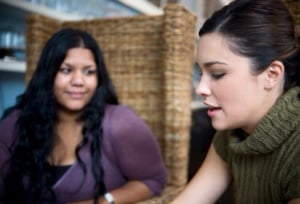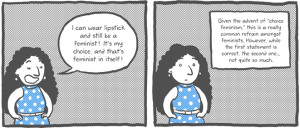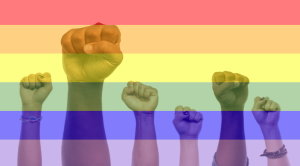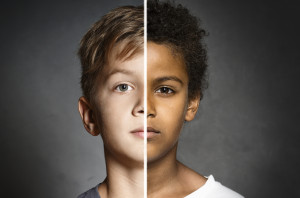
A rear view of two people walking down the beach with their arms around one another. Source: Time
As I sit here writing this after learning of the brutal murder of Natasha McKenna while in police custody, a death local authorities ruled an “accident,” a familiar feeling rises inside of me. I recognize this anger and this sadness.
Sadly, this is a feeling that comes up for me nearly every single day as I work not to allow myself to numb to the brutality Black, Brown, and Indigenous people experience at the hands of the police. And frankly, I have little patience at the moment for talking to White people.
Similarly, after the grand jury decided against indicting Darren Wilson, I found myself lashing out at those who share my race and who were defending the decision. I was incredibly snarky, and I was looking for the best thing to say to sound right, not to actually help them understand the roots issues of systemic racism at play.
Seeing these gruesome images is something all too common in our age of cell phone cameras and social media – not that the violence is happening more, only that we as White people are privy to this racist violence in a way we never were before.
Yet I’m watching my fellow White people do mental backflips to justify this violence and to deny that this is in any way connected to a wider system of racism in the United States.
And I should feel angry.
If we as White people striving to be in solidarity to people of Color don’t feel anger, then we seriously ought to question our motives and wonder whether our investment is solely intellectual.
But how that anger and hurt and frustration gets expressed will go a long way in determining how effective I am in working with White people – my people – for racial justice.
In thinking about that anger, I can’t help but remember this brilliant piece from Spektra Speaks that came out after the non-indictment of Darren Wilson – White People, Stop Unfriending Other White People Over Ferguson (seriously, if you’re White, you need to read this piece).
After all, if you’re anything like me, being told to “f*ck off” or being berated doesn’t exactly inspire me to self-reflect, to consider how I can be better and do better – and cutting White people out of my life doesn’t advance racial justice.
Far too much of what I have justified as “calling someone out on their privilege” was little more than a dismissive slight aimed at boosting my ego and making me look like the “best anti-racist White person.” How does that actually help anything?
Thus, the more that I think about it, I realize that White people who wish to work in racial justice solidarity and who strive for allyship need to realize our fundamental responsibility to do more than simply “call out” other White people.
We must take up the long, difficult, often emotionally-exhausting work of calling them in to change.
The Need for Tools
Changing ourselves and other White people is exhausting, but to be honest, our privilege does not afford us the luxury of lost patience if we truly want to do the work to realize racial justice.
We have a responsibility to cultivate a deep well of patience and compassion for working to change the hearts and minds of our people, just as our hearts and minds were changed somewhere along our own journey.
As my dear friend and mentor Carla reminded me recently, I have a responsibility to cultivate a deep well of agapic love for my people, the agapic love that Dr. King wrote so prolifically about, noting that agape doesn’t ask of us that we “like” those with whom we’re in conflict, only that we work for a love based in an “understanding, redemptive goodwill for all.”
Compassion alone, though, is not enough. We need skills.
The following, then, are some tools and considerations for how we as White people can do better to call our people into self-reflection, consideration, and change.
This list is drawn from my own experiences, but more so, it’s drawn from friends, acquaintances, and mentors of diverse backgrounds who are all committed to racial justice. Before offering up this list, then, I must thank those who have contributed to my understanding of this issue, some of whom will be named and cited through the piece even though there are far too many than can be named here now.
1. Decide When Calling In (Versus Calling Out and Walking Away) Is Warranted
There’s no way we can call in every single White person who says or does something racist. Not only is it not possible, but it’s not necessarily the best thing for our own mental health!
In her keynote at the 16th annual White Privilege Conference, Loretta Ross stressed the necessity of doing more than dismissively calling people out while also recognizing that she no longer has time for lost causes, those who are unable and unwilling to listen.
As my dear friend Sarah Ogden Trotta likes to remind me, we all have limited anti-oppressive energies, so we must decide where those energies will be the most effective.
Debating trolls on Twitter is not likely to be the most effective use of our energy, but maybe calling in that family member who uses coded racist language is.
Though I have a right to distance myself from abusive White people, I also have a responsibility to work to bring as many White people as possible into the struggle for racial justice.
Remember, then, that effective engagement is built upon a foundation of relationships.
That doesn’t mean that we can’t or shouldn’t call someone in with whom we don’t have a personal connection, but when we can cultivate a relationship that seeks to hear that person and reach them where they are, we are more likely to be effective.
Additionally, we shouldn’t see calling someone out or in as mutually exclusive behaviors. Both can be incredibly effective! We ought to think of it as Paul Gorski described it recently in an online discussion – as different parts of a spectrum of behaviors.
The question is, simply: Which action is most likely to bring us one step closer to racial justice?
Calling out is more likely to work for someone who is already reflective about their racial identity and privilege, but regardless of where someone falls, calling in is likely to require longer-term strategy and work.
2. Calling In Shouldn’t Mean Coddling White Fragility
It’s encouraging to see the notion of White fragility being discussed more regularly, a term coined by Robin DiAngelo to describe how White people insulate ourselves from racial discomfort and claim to be victims when we are confronted by our privilege or complicity in racism.
We should be clear, though, that calling someone in and meeting them in a place where they can actually learn doesn’t mean coddling White fragility.
The times when I have been most transformed by someone calling me in weren’t easy and didn’t feel kind or nice, but they were filled with tremendous compassion and a desire to inspire self-reflection and real change.
I see a lot of people conflate calling someone in with being nice or coddling people of privilege when they need to hear the hard truths about oppression. Difficult truth-telling isn’t in any way different from calling in, only that those truths are expressed in a different way than when we choose to call someone out.
Thus, we shouldn’t have to necessarily soften our rhetoric or our anger or passion. However, White people do have a responsibility to find ways to express those feelings in ways that others who share our racial identity will hear.
3. Make It Personal
One of the big criticisms of White people who work for racial justice is that we tend to be too intellectual in our analysis and reasons for doing the work. In order to effectively call someone in, though, we need to understand our own personal stake in realizing racial justice.
By connecting the conversation to our personal investment when trying to help someone reflect differently on their racial identity or privilege, we can help them understand what their own vested interest may be in working for justice.
As part of that conversation, it’s important to work and speak from our own empathic concern, whether rooted in witnessing the violent impacts of racism on the people of Color we love or from striving to understand how White supremacy hurts all people of Color.
Additionally, though, we must help other White people understand what we as Whites have at stake if we don’t divest from Whiteness. Whenever we choose to invest in Whiteness, we choose to turn away from our own humanity.
When we callously write off the violence that Black, Brown, and Indigenous people experience at the hands of police, we decide that Whiteness and its privileges are more valuable to us than those things that make us human, the ability to hurt when other human beings hurt, the ability to reach out and empathize and connect across difference.
And by talking with other White people about what we lose when we invest in Whiteness, we can all better understand our own stake in changing.
4. Bring the Conversation Home
More than anything, calling in our people requires that we find ways to meet people where they are and to connect the work to ourselves and our identities. This can be a hard balance considering that we can’t simply coddle White fragility.
But if we aren’t willing to at least try to frame the conversation in a way that our fellow White folks can access, we aren’t going to actually change anything.
Part of this, then, requires an intersectional ethic in our approach to talking with other White people. If the person I’m engaging comes from a low-wealth, rural Appalachian family, their experience with Whiteness is not going to be the same as my wealth-privileged one.
And if I am not cognizant of my own implicit sexism in talking to White women, I’m likely to perpetuate gender oppressive patterns in my approach that make it pretty hard for them to hear where I am coming from.
As a result, we must consider are the other areas in which our identity affords (or doesn’t afford) us privilege. As my friend Joanna reminded me, women in the US are constantly expected by men to do our emotional labor, and this can surely play out when a White woman tries to talk to a White man about our racial privilege.
Not every White person’s experience with Whiteness is the same, even if we all benefit from White supremacy and its resulting White privilege. Understanding this helps us frame the conversation in ways that can help both of us grow, learn, and change.
This can help others see racism and White supremacy not as something that exists somewhere out there in society (located in the US South or in the KKK or only in rural areas), but as systems that we all advance in our language and behavior on a daily basis, even in the context of our diverse identity experiences.
It helps us bring the work home.
5. Lean into the Discomfort
Y’all, calling someone in is hard. It’s uncomfortable – both for the person we’re calling in and for ourselves. So if we’re going to do it well, we have to get comfortable with discomfort.
Not every person is deserving of our emotional energy, but if we’re not at least willing to step into that space of discomfort with most of our people, we are falling short of our responsibility in allyship.
The reality is that we never grow when we are comfortable. We have to risk our own discomfort and that of others in order to realize change.
At the same time, though, we also don’t grow if we are so far outside of our comfort zone that we shut down. If we only call people out, establishing ourselves as the “right White person,” we risk alienating those who need to do the hard work to understand and work to dismantle power, oppression, and privilege.
So, no matter how uncomfortable it might make us, we have to be willing to lean into that discomfort and do the difficult work of calling in friends, family members, acquaintances, and colleagues. It is our responsibility, even if it makes us feel uneasy.
***
I get it. In the world of social media, it’s a lot easier to be short and angry with our people.
But when a Black person says to a White person who demands to be educated about race and racism that “Google is your friend – I am not your teacher,” it’s a radical act of self preservation in a society where White folks constantly demand emotional labor from people of Color.
When White folks do that, we’re dismissing our role as those who must take up that emotional labor.
We must recognize that when we choose to ignore racism or write off well meaning (if ignorant) White people, it’s not the same act of self preservation that people of Color choose; to walk away as White folks is an act of privilege.
After all, if it were solely up to people of Color to end racism, it would have ended centuries ago, and as tired as we may feel, our exhaustion is nothing compared to those actually experiencing oppression.
Our end goal, then, must be to build a critical mass of White people working to divest from our “possessive investment in Whiteness” while investing in and supporting the leadership of people of Color who have long been striving to build a world without racism.
And to accomplish that end, we have to do more to call in our people in to change.
[do_widget id=”text-101″]
Jamie Utt is a Contributing Writer for Everyday Feminism. He is the Founder and Director of Education at CivilSchools, a comprehensive bullying prevention program, a diversity and inclusion consultant, and sexual violence prevention educator based in Tucson, AZ. He is currently working toward his PhD in Teaching, Learning, and Sociocultural Studies at the University of Arizona with research interests in the role that White teacher’s racial identity plays in their teaching practice. Learn more about his work at his website here and follow him on Twitter @utt_jamie. Read his articles here and book him for speaking engagements.
Search our 3000+ articles!
Read our articles about:
Our online racial justice training
Used by hundreds of universities, non-profits, and businesses.
Click to learn more




















